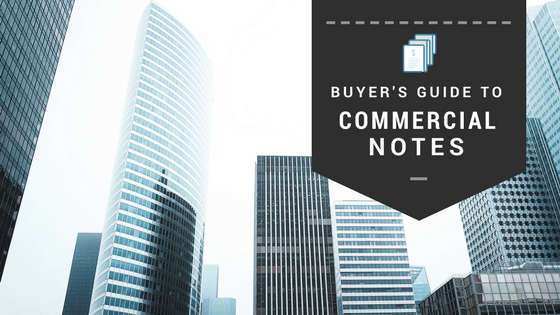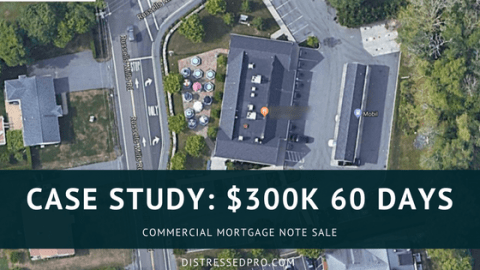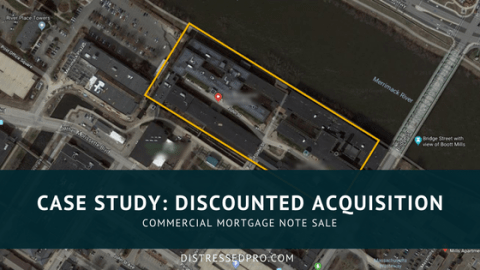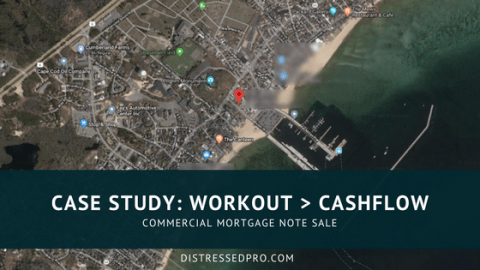
In this article, you will discover the advantages of investing in commercial mortgage notes. You will find out about the types of commercial debt available for investment and why the savviest investors love non-performing commercial notes.
Are you a real estate or note investor or broker looking to learn more about the opportunities in commercial mortgage note investing?
You’re in the right place.
We put this guide together to help demystify the non-performing commercial note business and help get you started with some fundamentals and resources.
A Primer on Investing in Commercial Notes
Commercial property is a huge field of opportunity right now, and could be easier to enter than you think. It’s all about understanding the game, and gaining the connections and sources to make the deals happen.
Experienced real estate investors and smart money managers are becoming converts to the realm of commercial property and the paper that finances it.
You’ll read about three case studies for commercial note strategies including one that netted the note investor more than $300,000 in under 60 days.
Here’s what’s covered in this guide:
What Are Commercial Notes

Typically the word “note” is used interchangeably with the word “loan.” So, a commercial note is a promissory note or loan.
In this guide, what we’re talking about isn’t so much commercial paper which is classified as short term debt that companies offer to the public or to investors, but loans that have been made to businesses and not to consumers.
In this context we’re looking at commercial mortgage notes and C&I, which are commercial and industrial and other asset backed loans. So, in contrast to commercial paper made up of short term bonds or loans, we’re talking about loans made to businesses, or for business purposes by banks and other lenders.
Non-performing commercial notes are defined as loans which are 90+ days late. There are other reasons that commercial mortgages can become classified as non-performing or distressed and we’ll touch on those later.
Types of Non-Performing Commercial Notes

Before you start looking for your first commercial note to buy, you need to understand the fundamental differences between the various types of notes and the best way to approach them.
A strategy that will work for one type of note could prove to be a disaster if you copied and pasted it into another.
There are two major classifications of loans that offer commercial notes:
- Those secured by real estate also known as commercial mortgage notes.
- Those not secured by real estate also known as non-mortgage commercial debt.
Commercial Mortgage Notes
Multifamily – Among the types of commercial notes that banks make to businesses are multifamily loans. These incorporate any mortgage loans made on five plus unit residential or mixed use buildings. Even if you have a mixed use building, as long as it’s got at least five units in it, and some of those are residential, the loan is classified as multifamily.
Construction – Construction loans can include mortgage loans for the construction of one to four family homes as well as commercial development and land acquisition and construction loans.
Commercial Property Loans – Commercial property loans fall into two main classifications:
- Owner occupied real estate loans
- Non-owner occupied property loans
Owner occupied commercial loans would include any notes where the loan is pledged against a property that the owner is using to run his or her business out of. They may be wholly using the premises for their own use or using a part or a single unit of a property for themselves.
Examples of owner-occupied commercial properties may be:
- Small office buildings
- Medical condos and hospitals
- Churches
- Retail stores
- Restaurants
- Gas stations
- Warehouses and industrial property
- Mixed use properties
Non-owner occupied commercial properties are those that are held purely for investment.
Non-owner occupied properties can also include:
- Office complexes
- Shopping malls
- Strip plazas
- Mixed use
- Land for development
Non-Mortgage Commercial Debt
Non-mortgage commercial debt is not secured by any real estate.
Unsecured Commercial Debt – This may include business lines of credit, merchant advances, and even business credit cards.
C&I (Commercial and Industrial) Debt – Most commercial loans not secured by real estate tend to be C&I loans, which is short for “commercial and industrial.” This refers to investments like asset backed loans and inventory or equipment financing. Sometimes in the auction business, we refer to some of the machinery as ‘yellow iron’.
This type of C&I debt and notes not secured by real estate are still secured by the inventory or personal guarantees from the principal borrowers and business owners or co-signers.
These are all the types of commercial notes and debts that can be traded. A private investor can buy a performing or non-performing, multifamily note, construction loan, commercial loan or a commercial and industrial loan. All of this is marketable and tradable paper that can be very attractive to investors.
At the end of this article we’ll show you three examples of why this is so, including a case study where a developer acquired a multi-million dollar development project for a little less than one million dollars.
Performing vs. Commercial Non-Performing
Diving further into investing in this sector, you have the choice of performing and commercial non-performing mortgage notes. Each offer different levels of risks and advantages for note investors.
Investing in Performing Commercial Mortgage Notes
Why invest in performing commercial mortgage notes?
The number one reason is for a secured stable return. When you have a performing note, you have a loan that is being paid on time by a business on a property, and the loan is secured by real estate. These commercial notes offer the investor regular monthly cash-flow from the loan payments with the principal secured by a commercial property.
That is an attractive investment.
This is ideal for the risk averse investor. Because:
- Commercial notes are typically lower LTV 50-80%.
- As an investor in the senior debt your interest comes before other lenders or the owner’s equity.
- If the owner fails to pay you, as the lender, have the right to foreclose to recover your principal investment.
- Interest paid by commercial borrowers is typically higher than residential notes which, as the lender, means a higher return.
- If the foreclosure and sale doesn’t make you whole on your investment most commercial notes have “recourse” which means that you can collect the balance owed from the borrower.
The Risks of Buying Performing Commercial Notes:
- Thinner yields can be depleted by asset management costs.
- Performing tenants default and become non-performing.
- Incorrectly assessing note and collateral value upfront.
The Advantages of Buying Performing Commercial Notes:
- Acquiring stable and consistent cash flow.
- Investments backed by tangible hard assets.
- Low management burden.
Investing in Non-Performing Commercial Mortgage Notes
Buying non-performing commercial mortgage notes offers a whole slew of other opportunities and risks that are completely different from buying non-performing residential loans or buying performing commercial loans.
Non-performing commercial notes usually point to loans on which the borrowers are behind on payments. Commercial loans, however, may also be criticized as non-performing or in default for a variety of other reasons, including changes in collateral value, bad acts by principal borrowers, property transfers, misplaced insurance paperwork, past due property taxes, or balloon loans which have matured, but not been refinanced.
Experienced commercial note investors typically invest in non-performers with one of two strategies. Either the investment is made in order to take control of the property and seize it from the owner or to get the owner to begin paying again and secure regular monthly cash-flow via a workout.
The Risks of Buying Commercial Non-Performing Notes:
- Environmental issues can plague a commercial property and since the liability of environmental problems runs with the land a foreclosing lender who takes possession of a “dirty” property assumes that liability.
- Dealing with the bankruptcy process in the commercial setting can take a long time and be costly. Although I should say that in my experience the commercial lenders are made whole in the end unless the market value has changed significantly.
- Markets change and in a quickly changing price environment long workouts, bankruptcy proceedings, or aggressive debtors can mean that the pricing can change enough that by the end of the proceedings the lender is no longer able to collect the full amount from the sale of the asset.
The Advantages of Buying Non-Performing Commercial Notes:
- Investors can see big discounts on commercial notes for sale.
Commercial properties often offer multiple exit strategies, beyond what is possible in the residential space. - A commercial borrower with a recourse loan has motivation to assist in achieving the highest exit price should a foreclosure be necessary and they can be bound to cooperate by opening the books and the property to bidders.
- The dollars in commercial property are typically higher than residential and so, for the same time and attention that you’d put into a residential deal the investor can earn substantially more in commercial.
- Speed of remedying defaults – Courts typically assume that commercial borrowers are experienced capable people who entered into a transaction fully informed and equipped and therefore tend to rule in favor of the lender
- Should you need to foreclose, and if you’re not made whole through the sales process, you have the ability to pursue deficiencies from typically affluent sophisticated individuals.
Where to Buy Commercial Mortgage Notes

The commercial note business begins with finding a note.
In fact finding notes is the most important, most highly paid task or job in the business.
Nothing happens in the note business until you have found a ready and willing seller.
With this in mind, don’t gloss over this next section since getting started in commercial notes must begin with finding commercial mortgage notes that you can buy
There are three main places to buy commercial mortgage notes.
- Direct from owners
- Banks and other lenders
- Special servicers
Direct from owners – It’s not uncommon for more savvy investors to sell their commercial properties with owner financing. Especially with smaller balance properties. They do that because they can minimize their tax implications when they sell.
If they ‘hold the paper’ they’re able to stretch out their tax liability over a period of years, rather than having to deal with it all up front. They’ll also get additional revenue from it, because they’re going to charge interest on the paper that they’re holding in.
One way that you can go online and find commercial notes for sale is that anytime you see someone listing properties for sale and they mention things like “seller will carry” or “owner carry” or “seller finance,” then they may hold other notes.
You may find them on Craigslist, for sale by owner websites, and so on. Investors can even use Google alerts and IFTTT to get notifications when deals like this get posted online.
Check out this video on setting up alerts for people marketing commercial properties as for sale by owner, or offering seller financed mortgages.
Buying Commercial Notes from Banks – The primary way to find non-performing or performing commercial mortgage notes for sale is to go to the banks. Today there are something like 5,792 banks out there. More than a third of them have commercial real estate. Most of them have commercial notes on their books.
Success in this area is all about knowing how to find banks with commercial notes that are able and interested in selling, and knowing how to connect with the right decision makers and make offers that they’ll accept.
Special Servicers – Special servicers are servicing companies that are set up to just to handle loans that are a non-performing or underperforming. A special servicer’s job is to get that loan re-performing or to facilitate a sale.
There are also commercial note brokers and auction platforms where investors can sell commercial notes and find inventory as a commercial note buyer.
If you would like a step-by-step guide on how to find and buy non-performing notes you can read about it here.
A lot of people are scared of buying commercial notes because they think that it’s going to somehow be more complicated and complex. The fact is that it’s very much the same as dealing with residential notes, with a few exceptions.
One is that you’re typically going to have far more cooperative borrowers. You’re going to have much more savvy borrowers too. That means you’re going to have a
much easier time handling the foreclosures. The laws are in your favor as the lender and the owner of the note, over those of the borrower.
The numbers are much bigger. So, that the deal that you do, if you’re going to make 10 percent on a deal, would you rather do a deal on $100,000 residential mortgage note or a $1,000,000 commercial note?
Commercial note investors are those who would rather make 10 times the amount for basically the same amount of work.
The Caveats & Resources

It’s really important that you understand the market in which you’re buying. It’s easy enough to get a bird’s eye view of what a residential market looks like from a lot of what’s available online. When we’re talking about commercial, you probably are going to need to dig a little deeper.
The collateral can be more complex and the debtors more savvier than homeowners. Investors have to be aware that there are considerations like zoning, permitted use, environmental and other considerations that affect the collateral.
This is by no means an exhaustive list of issues and considerations for investing in commercial notes but hopefully, it’s helped to whet your appetite and give you a better understanding of the potential and pitfalls in the commercial note business.
Check out these resources to equip yourself to succeed in finding, buying and profiting from commercial note investing.
Resources:
- Watch our free webinar where we give in-depth training on commercial notes: We had a long Q&A training call where we dive into commercial notes and the steps to a successful investment. You will learn how we buy notes that no one else wants & turn into 15% yields and how we consistently craft “Win, Win, Win” scenarios (Lender, Borrower, Investor).
- Crash course on commercial loan workouts:If you would like to generate a steady cashflow from non-performing commercial notes then this is the article for you. In it we cover the different workout options that you have. We have also included an interview with a seasoned investor in non-performing commercial notes.
- Here’s a list of Special Servicers that have commercial notes for sale:In this article we will discuss the pros and cons of working with servicers and list the top Special Servicers in the country.
Case Studies
Case Study 1: The Loan to Flip Strategy
How My Client Made $300,000 in under 60 days.

The first case study I want to talk about is the South Shore convenience store and gas station. This deal was for a client of mine that was a local hard money lender. They buy non performing debt from banks or they also originate notes and they do that all in the commercial space.
So this particular group bought a non-performing convenience store and gas station note from a very small bank. In fact this bank just had two offices so we’re talking about a very small state bank.
They had bought a bank that had previously made a loan on the gas station and convenience store. They just weren’t making money out of it, they had overpaid and so when the bank bought this other bank and assumed this loan they had this non performing commercial loan on their books whose full outstanding balance was somewhere around $1.6 million, might have been a little bit more than that.
The bank had already begun the foreclosure process on it but then realized that they were not prepared to own this asset and so they agreed to sell it to my client, a private note investor, who bought this note for just about $900,000. The reason they bought this gas station convenience store note, was that they they knew the market.
The first thing you need to understand is if you’re going to invest in commercial notes, you need to have an understanding of the market that you’re pursuing. The reason they were able to get the money so quickly for this deal, and we’ll talk about what quickly means in just a minute, is because they we were able to demonstrate expertise in a particular niche.
I wouldn’t presume to know, having never been there, what I could get for a flex industrial space in Omaha, Nebraska, that would not be a good investment for me because I don’t know what my possible options are there. I don’t know anything about the zoning. I don’t know anything about the tenants and so on and so forth.
When you’re deciding that you’re going to approach commercial notes it’s important that you really understand your market the same way these guys understood their’s.
My clients were two guys, one of them is mainly the underwriter and the other one mainly handles the individual assets. They went to this bank, and agreed to pay $900,000 for this note that the bank didn’t want to foreclose on.
They didn’t want to get into the chain of title, because they we weren’t sure how they were going to handle any environmental issues on the property if they should arise. So the way this worked is that they had begun the foreclosure proceedings, thought better of it, then decided to sell the note to my client.
My client bought it, took over the foreclosure with the attorney and raised the money so that they could go and foreclose on it if they needed to and acquire the note.
The reason they were able to get the money so quickly is because they already demonstrated their expertise to their investors, so they acquired the note for about $900,000.
We picked up with the foreclosure attorney and proceeded to the foreclosure auction. Now what we had done is we’d negotiated up front with the gas station and convenience store owner that if they would allow us to show the property, share their financials, be a cooperative debtor and have a friendly foreclosure then we would offer them some forgiveness.
When you’re dealing with a commercial asset like this and there’s recourse on the loan to the owner, it is in their best interest to cooperate with you in the foreclosure auction and that’s exactly what they did. They let us bring bidders through the property and tour it and let us share numbers, so when we got down to business we knew who our bidders were going to be.
We had already toured them through the property and we knew that they owned other gas stations. They each showed up with a couple hundred thousand dollars certified check and at the end of the day we ended up selling the property for $1.2 million.
My client came in with $900,000 in the middle of a foreclosure process, picked that up in the middle of December and by the middle of January we already full stride. We had completed our marketing campaign for the auction and held the auction. We got to a final bid of about $1.2 million on that auction and then closed nineteen days later with cash.
So my client, the private note investor, never took possession of the property. All they did was push some paperwork around and they understood the assets so that they could get their investors on board. They pushed the paperwork around so that they could proceed with the foreclosure and then they foreclosed on and delivered the asset to a third party, never getting in the chain and title at all.
| Purchase Price | $900,000 |
| Final Auction Bid | $1,200,000 |
| Profit | $300,000 |
They used 100% of other people’s money, that’s the $900,000 with a $300,000 return and it was under sixty days from start to finish. They never got in the chain of title of the property which meant that they never had any liability if there happened to be any environmental issues on the property.
Case Study 2: The Loan to Own Strategy

The second case study is about a client that was working on a big construction project and it was about converting lots and lots of mill space hundreds of thousands of square feet of mill space into a combination of condos and multi family units. The condos and rentals units had HUD money in it and a little money from the city and it had a lot of money from my client, who in this case was a major regional bank as the senior sponsor for the whole package.
The total debt on the project was a lot, it was in the high 7 to low 8 figures and that was a lot for the state that this particular construction was in. It was maybe twenty five or thirty percent finished, and they were delivering it in different sections.
Their procedure was to complete one section of the mill and then they would sell out those units, and they just proceeded like that. At some point they ran out of money and that’s when we got called in. We looked at this deal and nobody wanted to own this.
The bank certainly didn’t want to own this deal because that would mean that they’d have to go out and hire contractors, get building permits and they’d have to do inspections and all of that.
It was just too much for them to take on, and so we still proceeded with the foreclosure auction, but with the idea that we would sell the note midstream, so that’s exactly what we did. We sold the note to one of the contractors who was involved in the whole process and had something to lose.
He took over the foreclosure proceedings but he didn’t have the same plan as the previous case study. Instead, his plan with this was to own it at a very low basis. Imagine this contractor comes in and he’s owed $1 million on this project where there are cost overruns and the total debt on the project is somewhere closer to $12 million.
Even though he was already facing a loss, he came in and bought the debt on the first position which then wipes out everything that comes behind it. So if they bid up through it, it wipes out all of the junior debt. When he bought the note the intention wasn’t to foreclose and sell it to a third party and make a little money. His intention was to gain control of the property and that’s exactly what we did.
We bought the note, proceeded with the foreclosure auction, showed up to the auction and the the lender, who was the contractor but bought the debt from the banker, now becomes the lender and then makes what’s called a credit bid.
Because he already owns the note, he doesn’t have to make an actual bid with real money. He makes a credit bid, which means that he’s bidding up to and through the amount that he is owed. He bid just up to the minimum of what would be reasonable and customary based on his credit.
We had no other bidders to come in above him, and that meant that he ended up owning this entire project for the cost of the note, which was less than a million dollars. This put him in that property, in the state that it was, for only about twenty five or thirty percent of the actual total cost basis of the property as it sat at that time.
So instead of the loan to flip strategy , which we saw in the previous case study, in this one, their aim was to gain control of the asset at a discounted basis and that is actually exactly what they did.
Case Study 3: The Workout to Cashflow Strategy

The third case study is about is a firm that we worked with out of northern New England. All they do is buy non-performing owner occupied commercial real estate debt and the reason they do that is because they don’t want to go around and foreclose and own the properties. But if they have to they will and they know how, instead they want to go out and do workouts with the owners.
The owners are very motivated to do workouts because they’re running the entire business through these properties and that’s their livelihood. If you think about what it’s like for a small business person who owns the real estate where they’re doing their business, this is probably the most expensive and most valuable asset that they own.
Not only that, it’s also the sole source of all of their income, so their importance can’t be understated. These are the types of loans you find in small manufacturing, in retail like your local hardware store, gift shop or knitting store, gas station, hotels, motels and bed and breakfasts.
These are places where people own the real estate and own and work in the business taking place on the property. A large portion of their assets are tied up in the real estate, in the business and in their revenue. Their income on a day to day basis is tied up in the business that is being run on the property that’s in debt and in trouble.
So what we would do then, is go and buy a package of these, and then we’d initiate workouts. Our goal was to get the notes re-performing and cash flowing indefinitely with no intention to own the property in the future.
If you can get these people successful again and get them making money and paying the bill, then you have a key couple of options.
- You can resell that note and make up the difference if you buy it at a discount.
- If you continue to simply receive payments, then you have just outsized cash flow returns.
- If you decide to sell it, then you’ve increased the total value of the asset by getting it re-performing and you’re able to sell it.
So, there are a lot of different examples of these. One of the ones that I can tell you about is where they bought. Now. Set for $600,000 the total value of the things, about $900,000. This was a very high end gift shop boutique in a very in like art in that kind of thing, in a very popular tourist destination. And what we did just bought the note. There is this came in, a pool of notes went out, and we were able to work out a deal with the owner, so that they continued to pay, and nobody had to foreclose on it. And they were able to continue to run their business. So those are three different strategies.
If you are interested in more commercial note case studies, then you will love or in-depth Q&A where we share industry best practice and go through more case studies. Click here to learn more.
Conclusion:
One of the best investment opportunities today appears to be in non-performing owner occupied commercial notes. We’d love to hear what questions you have about non-performing commercial mortgage notes, your experiences with them, and even if you have these types of notes for sale in the comments section below…
[social_warfare]


We are looking for Note Buyers. If you would kindly send me any addresses, names, an phone numbers who you know who would be interested in buying our notes. Please send me your list to my email.
Our verified investors database is for paid members. thanks.
would like more on cmmercial note investor